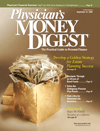Publication
Article
Physician's Money Digest
Gauge the Effect of the Fed's Rate Hike
At the end of June, the FederalReserve raised its federal fundsrate (ie, what banks charge eachother for overnight loans) from 1% to1.25%. The prime rate, which affectsconsumer and small business loans,increased from 4% to 4.25%. The ratehike was the first by the fed in 4 years—a period that saw short-term rates dropfrom 6.5% to 1%. While small, the hikemay foreshadow what experts believewill be a series of modest rate hikesmade by the fed over the next 12 to 18months to dampen the risk of inflation.
Borrowers Beware
Many borrowers will be among thefirst to feel the impact. Consumers whohave run up large balances on variablerate credit cards and home equity linesof credit will soon see rates tick up.Financial planners advise consumers topay down as much of this kind of debt aspossible by cutting other expenses orfinding ways to boost income. Anotherconsideration is debt consolidation.Transfer high-rate credit card balances tolow-rate home equity loans, which,while going up, won't cost nearly asmuch as credit cards.
Note:
The impact of rising interest rates onhome mortgage loans sparks a littlemore debate. Some planners think it'sokay for homeowners to continue usingadjustable rate mortgages (ARMs), butonly if they plan on living in the homefor less than 10 years. Look carefullyat their annual and lifetime ratecaps. Other planners recommend ARMsthat have fixed rates for the first 3 to 10years before they readjust to the floatinginterest rate. But if you plan on living inthe house longer than 10 years, it mightbe worth locking in a standard fixed-ratemortgage, which, although higher thanARM rates, is still low.
Big Investment Picture
Investors and retirees who have moneyin CDs, savings accounts, and money marketaccounts are somewhat cheered bythe higher rates. That's because interestrates for these types of accounts havebeen abysmal in recent years. Still, it'ssomewhat of a mixed blessing. The majorreason the fed raised rates again is todrive a stake through inflation before itstarts roaring, which is never good newsfor retirees living on fixed incomes.
Modest inflation resulting from anexpanding economy is often a good signfor stock market investors, but highinflation is not. According to many planners,the more immediate concern forinvestors involves bonds. Many bondinvestors don't realize that when interestrates rise, bond prices decline—and thelonger the maturity of the bond, thefaster the decline. Many planners recommendthat investors shorten the maturityof their overall bond holdings, whichwill allow them the flexibility to reinvestas rates climb up again.
Planner recommendation:
Another potential investment area toconsider is commodities. Investors shouldalways consider commodities in a portfolioas a good diversifying asset. And commoditiestend to do especially well duringinflationary times. Even if interest rates continue toclimb, don't panic. If the fed continues tomake modest rate increases, it's likelybecause the economy is expanding, andthat's good for everyone.
This article has been produced by the Financial
Planning Association (www.fpanet.org), which is
the membership organization for the financial
planning community.
